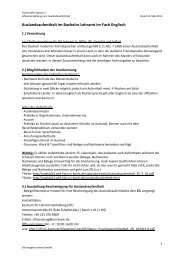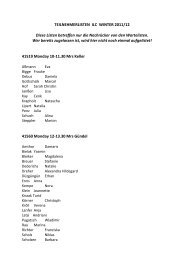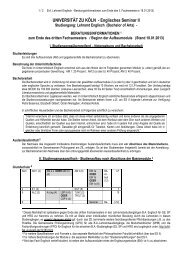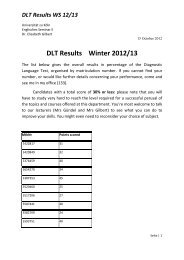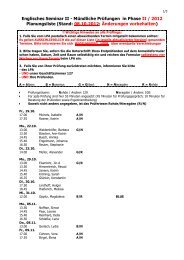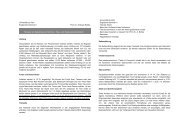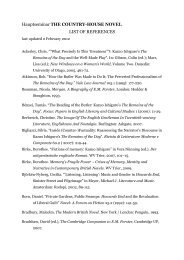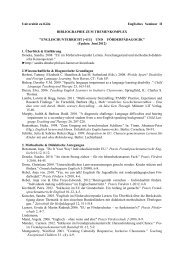STUDENT SCRIPT - Englisches Seminar II - Universität zu Köln
STUDENT SCRIPT - Englisches Seminar II - Universität zu Köln
STUDENT SCRIPT - Englisches Seminar II - Universität zu Köln
You also want an ePaper? Increase the reach of your titles
YUMPU automatically turns print PDFs into web optimized ePapers that Google loves.
Nieragden: ILCS 3<br />
WHY CAN LITERARY STUDIES SEEM SO CONFUSING? YOUR THOUGHTS:<br />
(a) Culler [1997:16-17]:<br />
Theory makes you desire mastery: you hope that theoretical reading will give you the concepts<br />
to organize and understand the phenomena that concern you. But theory makes mastery<br />
impossible, not only because there is always more to know, but, more specifically and<br />
more painfully, because theory is itself the questioning of presumed results and the assumptions<br />
on which they are based. The nature of theory is to undo, through a contesting of premisses<br />
and postulates, what you thought you knew, so the effects of theory are not predictable.<br />
You You have have not not become become master, master, but but neither neither are are you you you where where you you you were were before. before. You You reflect<br />
reflect<br />
on on your your reading reading in in new new ways. ways. You You have have different different questions questions<br />
to to ask ask and and a a better better sense sense of of the the<br />
the<br />
implications implications of of the the the questions questions you you put put to to works works you you read.<br />
read.<br />
(b) Ansgar Nünning. 1997. “On the Uses (and Abuses) of Theories and Metalanguages in<br />
Literary and Cultural Studies: Ten (teutonic) Hypotheses and Some Suggestions.” European<br />
English Messenger VI/2, pp. 25-32.<br />
1. Literary-historical ‘objects’ such as genres, genres, periods, periods, or or ‘movements’ ‘movements’ are are neither neither given given nor<br />
nor<br />
found, found, but but con constructed con structed by an observer who uses explicit theories theories or proceeds from intuitive<br />
assumptions. assumptions. 2. There here are are no no ap approaches ap<br />
proaches to to literature literature nor nor forms forms of of criticism criticism or or close close-reading<br />
close reading reading<br />
that that are are not not based based on on theoreti theoretical theoreti cal as assump as<br />
sump sumptions. sump tions. [...]<br />
► WHAT DO YOU YOU YOU YOU EXPECT FROM LEARNING ABOUT LTERARY STUDIES?<br />
.<br />
....



